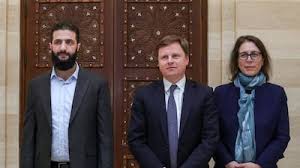In a significant revelation that sheds new light on the architecture of Syria’s post-Assad political transition, Independent Arabia has identified the London-based NGO Inter Mediate as the organization that helped politically train Syria’s new president, Ahmad al-Sharaa—formerly known as Abu Mohammad al-Jolani, the former leader of Hay’at Tahrir al-Sham.
At the center of this revelation is Jonathan Powell, the organization’s founder and one of Britain’s most seasoned conflict negotiators. Powell, who now serves as the UK’s National Security Adviser, has played a pivotal role in facilitating transitions from armed struggle to politics in conflict zones around the world—from Northern Ireland to Colombia. His involvement in Syria’s political transformation, although previously obscure, points to a quiet but strategic British influence on the country’s emerging leadership.
From Extremism to Statecraft: The Syrian Experiment
The article confirms earlier claims by former U.S. Ambassador Robert Ford, who revealed in a recent policy forum that he had worked alongside a British conflict resolution NGO to advise Sharaa as early as 2023. At the time, Sharaa was transitioning from a controversial militant past toward what would become a bid for national leadership. While Ford said he initially hesitated, he ultimately agreed to participate in the political rehabilitation project after learning more about its structure and goals.
According to Syrian analyst Malek Hafez, Powell’s organization not only helped shepherd Sharaa’s political transformation, but continues to operate a media office inside the Syrian presidential palace, reportedly run by two women—one British, the other of Lebanese-British heritage. This detail, not officially confirmed but widely discussed in Syrian political circles, underscores the depth of Inter Mediate’s integration within Syria’s new power apparatus.
Who is Jonathan Powell?
Powell’s credentials are formidable. He served as Chief of Staff to British Prime Minister Tony Blair from 1997 to 2007, and was the UK’s lead negotiator during the Northern Ireland peace talks that ended decades of sectarian violence. In 2011, he founded Inter Mediate to bring his model of quiet diplomacy and backchannel negotiation to some of the world’s most intractable conflicts.
After helping broker a historic peace deal in Colombia between the government and the FARC rebel group, Powell emerged as one of the world’s premier political mediators. His appointment in late 2024 as National Security Adviser to Prime Minister Keir Starmer signaled a return to government—and raised eyebrows among those closely following the Syrian file.
Strategic Influence Without Public Sponsorship
While London has avoided presenting itself as an official sponsor of Syria’s transitional authorities, its fingerprints are increasingly visible. British strategy, according to analysts, seeks not to dominate post-conflict transitions but to shape and stabilize them from behind the scenes—especially in countries emerging from jihadist governance or authoritarian collapse.
As Malek Hafez argues, “The rise of Ahmad al-Sharaa was not spontaneous—it was carefully engineered through a long-term, Western-backed strategy, in which Britain played a disproportionately influential role among Western powers.”
Britain’s approach, he says, reflects a long-standing doctrine: managing balance within fragile states without tipping the scales toward overt clientelism or chaos.
The Role of Inter Mediate
Founded with the aim of resolving “the world’s most difficult conflicts,” Inter Mediate operates in murky terrain—where conventional diplomacy stalls and formal institutions collapse. According to its website, the NGO specializes in discreet political dialogue and strategic mediation, often in environments that lack functioning peace processes.
Its newly appointed CEO, Claire Hajaj, is herself a figure emblematic of this duality. Of Palestinian and Jewish heritage, she has worked in conflict zones from Gaza to Kosovo, and began her career at the UN Security Council’s Counter-Terrorism Committee in 2002. Inter Mediate positions itself as a bridge between the diplomatic world and communities in conflict, drawing on the experience of former diplomats, negotiators, and humanitarian leaders.
Despite repeated attempts, Independent Arabia noted it had not received a response from Inter Mediate regarding its role in Syria.
Diplomacy in the Shadows
The revelation that Powell’s team worked directly with Sharaa, and that its ties continue even after Powell’s appointment to Downing Street, raises pointed questions about the blurred lines between NGOs, intelligence, and policy. The fact that a private conflict-resolution organization helped shepherd the political transformation of a former jihadist into the president of Syria—without public scrutiny—speaks to a new model of strategic statecraft.
Former Ambassador Robert Ford, now a senior fellow in U.S. policy circles, was the first Western official to publicly visit Hama during the Syrian uprising in 2011, an act that cost him his post amid backlash from the Assad regime. His recent disclosure of Inter Mediate’s role adds weight to the claim that international networks helped repackage Sharaa not only for domestic legitimacy, but for foreign acceptance as well.
Between Realism and Reinvention
British influence is not absolute. But it is, by many accounts, among the most deeply embedded Western presences in Syria’s transitional landscape. While the United States, France, and regional players jockey for influence, Britain’s quiet yet structured approach appears to be guiding the narrative arc of Syria’s political reinvention—not with tanks or treaties, but with training sessions, policy papers, and elite access.
“We are witnessing,” Hafez writes, “a new model of governance being shaped under the sponsorship and strategic equilibrium of international powers. And Britain holds a privileged stake in that process.”
The transition of Ahmad al-Sharaa—from jihadist commander to transitional president—is being cast by some as a bold experiment in pragmatic diplomacy, one that transforms insurgents into statesmen. Whether that experiment succeeds in stabilizing Syria or deepens its political ambiguities remains to be seen.
But one thing is clear: Britain has chosen its seat at the table. And it’s not at the front—it’s behind the curtain, pulling strings with purpose.
Malek Hafez is a Syrian journalist and researcher
This article was translated and edited by The Syrian Observer. The Syrian Observer has not verified the content of this story. Responsibility for the information and views set out in this article lies entirely with the author.


